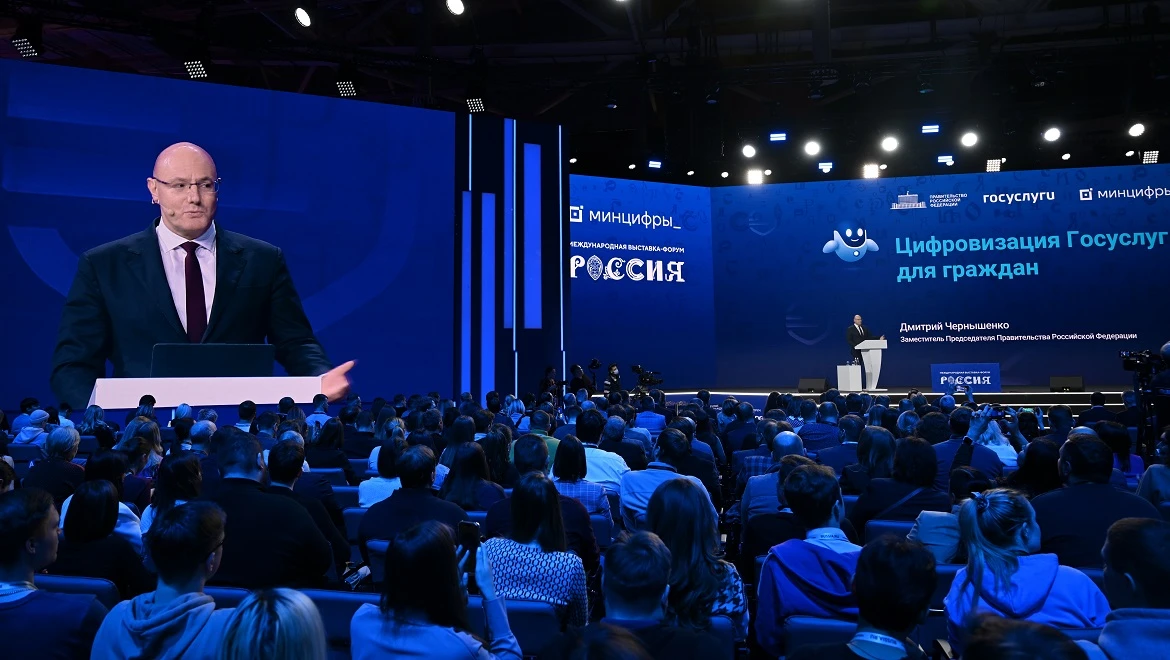Superservice: digitalization of state services discussed at the RUSSIA EXPO
The National
Achievements Forum: State Services kicked off at the exposition - it is
dedicated to online interaction between a person and the state, as well as
achievements in this area.
Dmitry
Chernyshenko, Deputy Prime Minister of Russia, spoke about the key results and
achievements in the field of state services at the plenary session. He noted
that just 10 years ago it was difficult to get a particular service because of
bureaucracy and the need to personally visit government offices.
"People
had to stand in queues for hours and collect a lot of paper certificates in
different departments. This situation in no way corresponded to the modern idea
of a human-centered state. The Presidential Decree, which defined digital
transformation as one of the five national development goals of Russia, became
the impetus for the widespread digitalization of the interaction between the
citizen and the state," said Dmitry Chernyshenko.
According
to him, in 2019 only 5% of mass socially important services were available in
electronic format, and now this indicator is already 100%. Dmitry Chernyshenko
noted that more than 87% of certificates, social benefits and allowances can be
obtained online. By the end of this year the remaining 13% will be added to
them.
Now there
are almost 110 million confirmed accounts on the Gosuslugi (State Services)
portal, the daily audience is 11 million people. A total of 340 million
services have been provided to citizens - the most popular of them are: unified
allowance for children and pregnant women, remote electronic voting, migration
registration of foreigners, obtaining information from the Unified State
Register of Real Estate and tax notifications. In terms of traffic and the
number of active users per day, Gosuslugi is the fifth digital ecosystem in
Russia, emphasized Dmitry Chernyshenko.
One of the
directions of the portal's development is superservices, through which a user
can receive several services at once. Now there are already 13 such services:
"Digital Construction", "Justice Online", "Paperless
Transportation of Passengers and Cargo", "Notification and Appeal of
Fines for Traffic Violations Online", "Birth of a Child",
"Digital Enforcement Proceedings", "Registration of Europrotocol
Online", "Labor Relations Online", "Social Support
Online", "Online Disability Assistance", "Pension
Online", "Enrollment in Higher Education Online" and "Far
Eastern and Arctic Hectar", said Dmitry Chernyshenko. He explained the
principle of their work on the example of enrollment in a university and the
birth of a child.
"Superservice
allows you to submit documents to a higher education institution without
leaving home. The procedure is as convenient as possible: the application time
for some users is a little more than one minute. Applicants from distant
regions of Russia no longer need to travel across the country - future students
save time and nerves. Last year, almost 1 million people used the superservice
- twice as many as the year before. The Birth of a Child superservice (launched
in April 2022) has made life easier for young parents. There it is now possible
to register the birth of a child without visiting a civil registry office or
MFC. More than 350 thousand electronic applications for birth registration have
already been submitted. It is also possible to register a child at the place of
residence online - today we already have more than 450 thousand such
registrations," said Dmitry Chernyshenko.
The global
task now is to make bureaucratic processes unnoticeable for citizens, said Deputy
Prime Minister.
"People
should quickly, conveniently and in the single-window mode be able to receive
all services. This approach is based on the concept of three zeros. Zero entry
- a person does not need to enter anything manually, does not need to provide
any documents and certificates. Zero waiting - interdepartmental requests are
made automatically, all data are retrieved and checked at the moment of their
sending. Zero exit - no 'covers' and 'papers', everything is processed
online," concluded Dmitry Chernyshenko.
The plenary session is dedicated to "unpacking" the State Services, the work of which will be explained by profile managers, said Minister of Digital Development, Communications and Mass Media Maksut Shadaev.
"Today we will tell you how we enable the whole process, what a large digital infrastructure there is under the "hood" of Gosuslugi, what systems are working, what our development plans are. Today there will be mainly presentations by technical executives, who will talk about the technology of the State Services," said Maksut Shadaev.
In particular, the participants discussed the ecosystem of the Gosuslugi portal and interaction with the agencies that should provide them. In addition, plans for the development of the portal's digital assistant "Max" were announced - it has already processed more than 645 million appeals. The experts also noted the high level of security of the service and the digital identification capabilities it provides - including biometrics.
The film and television actress, TV producer, and cookbook author Maria Kravtsova congratulated men on Defender of the Fatherland Day.
Defender of the Fatherland Day embodies courage, loyalty, and responsibility towards future generations.
Defender of the Fatherland Day is more than just a date on the calendar.





